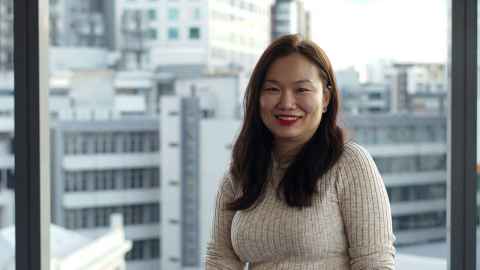Doing good with AI
1 July 2024
There’s plenty of negative talk about the potential impacts of artificial intelligence, but it’s not all doom and gloom, says Professor Yun Sing Koh.

To the human eye, one stoat looks very much like another.
And that’s a problem for those who want to keep track of the wily predators and monitor their impact on vulnerable wildlife, like birds that nest on the ground or in holes.
Te Korowai o Waiheke has been monitoring stoat populations in its efforts to rid them from the island, but the conservation-focused charitable trust was unsure how many they were dealing with. Camera traps could confirm the predators were there, but not if they were capturing the same stoats all the time, or different ones.
So, the group turned high-tech. Specifically, it turned to the University’s Centre of Machine Learning for Social Good, which has since been developing a system that deploys machine learning to re-identify the island’s stoats and gain a more accurate population count.
Co-director Professor Yun Sing Koh says the centre has created bespoke AI technology trained in part on data from stoats held in captivity by Crown Research Institute Manaaki Whenua/Landcare Research. Six months into the project, the system has successfully re identified stoats captured on cameras during daylight on Waiheke Island, and now aims to identify individual critters in the dark. Ultimately the technology could be used to identify other predators, she says.
Talk of AI is everywhere right now, and Yun Sing says the conversations often take a negative view of the technology. But “it’s not all doom and gloom”, she insists, saying such examples of projects being undertaken at the centre show how AI can be used to create positive environmental and social outcomes.
“Our research projects emerge from the conversations that we have with communities to understand, what are the problems out there? And how can we use machine learning and AI to solve them? If we start with a real-world problem, that’s how we think we’ll be able to create a longer-lasting impact.”
While AI is experiencing a moment, Yun Sing has been working in the field for decades.
“I always tell people I looked at AI before it was cool,” she laughs.
If we start with a real-world problem, that’s how we think
we’ll be able to create a longer-lasting impact.
After completing a masters in software engineering at the University of Malaya, she ended up doing her PhD in machine learning at the University of Otago and later joined the University of Auckland in 2010.
“What initially attracted me to this area they called machine learning and data mining was its combination of applied maths, stats and computer science, which is where I like to sit. I could see there was a lot that could be done in the area, which, of course, has now exploded.”
AI’s transformative potential is huge, she says. She cites PwC’s recent Global Artificial Intelligence Study, which notes AI will potentially contribute $15.7 trillion to the global economy by 2030 – more than the current combined outputs of China and India. It notes $6.6 trillion of this will likely come from increased productivity.
“From my perspective, AI is going to enhance people’s jobs. It’s going to be like a co-pilot that helps make you and your job more efficient and faster. It will remove a lot of the grunt work so you can focus on things that really matter and have more time to spend on the cases that require more thought.”
She admits the fast-moving nature of AI research is exciting but can also feel scary.
“That’s why we have to train people to be responsible in how we’re developing these AI techniques, so they can be used responsibly.”
Yun Sing is director of the University’s Master of AI programme, which launched this year with a cohort of 33 students drawn from academia and industry. Aiming to educate the next generation of AI professionals, it has four core courses: the fundamentals of AI (part of which Yun Sing is teaching); how to build AI systems; how to manage AI projects; and AI’s ethical, philosophical and social implications.
“People think AI is going to put them out of a job, but when they invented cars a lot of people thought that as well. This is another of what I call a tech evolution and, as how we interact with AI emerges, there are going to be a lot of new opportunities opening up.”
Unless, of course, you happen to be one of those stoats.
Caitlin Sykes
This story first appeared in the July 2024 issue of UniNews.